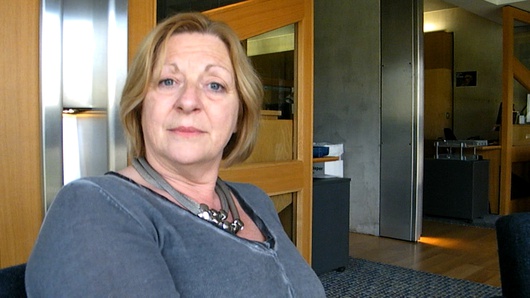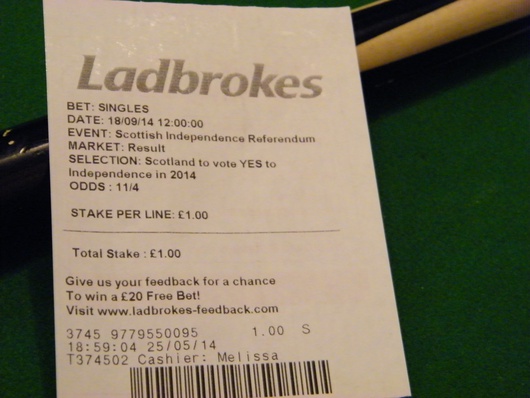
Independent Scotland: Edinburgh's Best Bet
Published on
Translation by:
Sophia BengtssonIndependence from London? The referendum decided by the Parliament on the Royal Mile for September 18th is approaching. In Edinburgh, the future of the currency and petroleum is up for grabs. Meanwhile the bookies are having a ball: record bets in Glasgow and seven-digit wins are expected.
Nigel Farage's UKIP managed to get their hands on one of Scotland's seats in the European Parliament. But despite their success, they did not manage to beat the Scottish National Party, under the leadership of Alex Salmond. The leader of the UKIP had to settle for 10.5% of the votes, while the SNP got 29%, still significantly less support compared to the general election in Scotland in 2011, when the party secured 53.5% of the seats.
This relative defeat may have negative consequences in terms of the party's larger objective: pointing out the differences between Scotland and the rest of the UK and securing a Yes to Independence.
There are numerous questions being asked by Scots and Brits about a future with an independent Scotland. All it takes to understand the complexity is to visit a local pub and ask around.
The future currency beyond the territories of Hadrian's wall, the exploitation of the oil fields in the North Sea and the fate of the Trident nuclear missiles of the naval base of Clyde are some of the biggest issues on the table. Furthermore, what type of welfare state could an independent Scotland? How will the education system work? What sort of relationship would Scotland have with the European Union? Not the usual clichés of haggis, whisky and bagpipes; the battle for independence is more than ever about geopolitics and economics.
Nuclear submarines, Currency and oil
Linda Fabiani, an MP of the Scottish National Party and member of the Referendum Scotland Bill Committee, greets us after a debate on Scottish justice reform. José Manuel Barroso, the outgoing president of the European Commission, has expressed uncertainty concerning Scotland's membership in the EU as an independent state, while others claim it would be possible as long as Scotland would officially apply to become a member and join the euro.
"The Pound Sterling is a Scottish currency as much as it is English, northern Irish and Welsh," says Fabiani and explains that maintaining the currency in the framework of a currency union is the most appealing alternative for the SNP.
 If the vote is yes to independence in September, one of the upcmong tasks will be negotiating the terms with the British Prime Minister David Cameron and the British banks; neither of which are particularly enthusiastic about the idea.
If the vote is yes to independence in September, one of the upcmong tasks will be negotiating the terms with the British Prime Minister David Cameron and the British banks; neither of which are particularly enthusiastic about the idea.
An indespensible objective of Salmond's government is the removal of British atomic weapons from Scottish territory. "We are against nuclear weapons, full stop," argues Fabiani. "They were imposed on us and they will have to go."
The Trident misslies are located 25 miles (approx. 40 kilometres — Ed.) west of Glasgow, but another crucial element of the Scottish independence argument is found further north, in the sea. The Scottish government is doing its best to paint a picture of Scotland as a future independent and rich producer of petroleum, but not without criticism from sceptics. The Times has published data suggesting that "the oil-generated revenues have been decreasing and will actually end up far below the forecast of the Scottish government."
"NO" is still in the lead
In general, the press seems to be leaning more towards a negative vote. However, analysts like Nicola McEwen, director of the Economic and Social Research Council (ESRC) at the University of Edinburgh, highlights that the Yes-campaign is gaining more ground in social media. Even 16-year olds, European residents and Commonwealth citizens that register before September 2nd will have the right to vote, and the internet may be an important medium for these groups.
 According to polls, the NO-side is still in the lead, but the battle is far from over. "In three months of campaigning, the balance can change completely, especially since Yesscotland has the advantage of more financial and organisational resources," says Toni Giuliano, coordinator of the sectoral groups of Yesscotland. He claims they have over 250 committees on Scottish territory, organised in the "largest campaign that Scotland has ever seen." It is safe to say that the Yes-side is relying heavily on the emotional appeal of their message. According to Nicola McEwen, the Bettertogether campaign is suffering from a lack of leadership and is focusing almost exclusively on the cost of independence, using negative arguments. The Yes-side is making use of emotional factors more easily translated into positive messages. McEwen also explains that men are more inclined to vote for independence than women, and that more women are among the indecisive voters.
According to polls, the NO-side is still in the lead, but the battle is far from over. "In three months of campaigning, the balance can change completely, especially since Yesscotland has the advantage of more financial and organisational resources," says Toni Giuliano, coordinator of the sectoral groups of Yesscotland. He claims they have over 250 committees on Scottish territory, organised in the "largest campaign that Scotland has ever seen." It is safe to say that the Yes-side is relying heavily on the emotional appeal of their message. According to Nicola McEwen, the Bettertogether campaign is suffering from a lack of leadership and is focusing almost exclusively on the cost of independence, using negative arguments. The Yes-side is making use of emotional factors more easily translated into positive messages. McEwen also explains that men are more inclined to vote for independence than women, and that more women are among the indecisive voters.
The Biggest bet ever
Ladbrokes pays 1.29 times the bet if Scotland remaining in the UK and 3.75 times the money for Scottish independence. William Hill also lets you bet on which currency Scotland will have and on the voter turnout. The English broker (where Yes gives 3.25 and No, 1.33) reveals that 52% of the bettors have bet on No and 48% on Yes. A 50-year-old Scot from Glasgow has placed 200,000 Pound Sterling against independence in what is said to be the biggest political bet of all times. Hill expects the betting turnover of the Scottish referendum to be seven digits.
 The whole debate around the referendum has the air of a bet. Will Scotland, with its 5.2 million inhabitants, manage to vote Yes and take on the enormous responsibility — economic as well as political — that follows? Maybe. But losing this bet implies more than just throwing away the ticket.
The whole debate around the referendum has the air of a bet. Will Scotland, with its 5.2 million inhabitants, manage to vote Yes and take on the enormous responsibility — economic as well as political — that follows? Maybe. But losing this bet implies more than just throwing away the ticket.
this article is part of a special edition dedicated to edinburgh and part of the EU in Motion-project, with the support of the European Parliament and the Foundation hippocrène.

Translated from Scozia indipendente: la scommessa di Edimburgo



